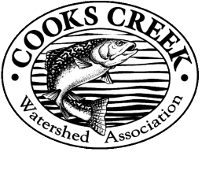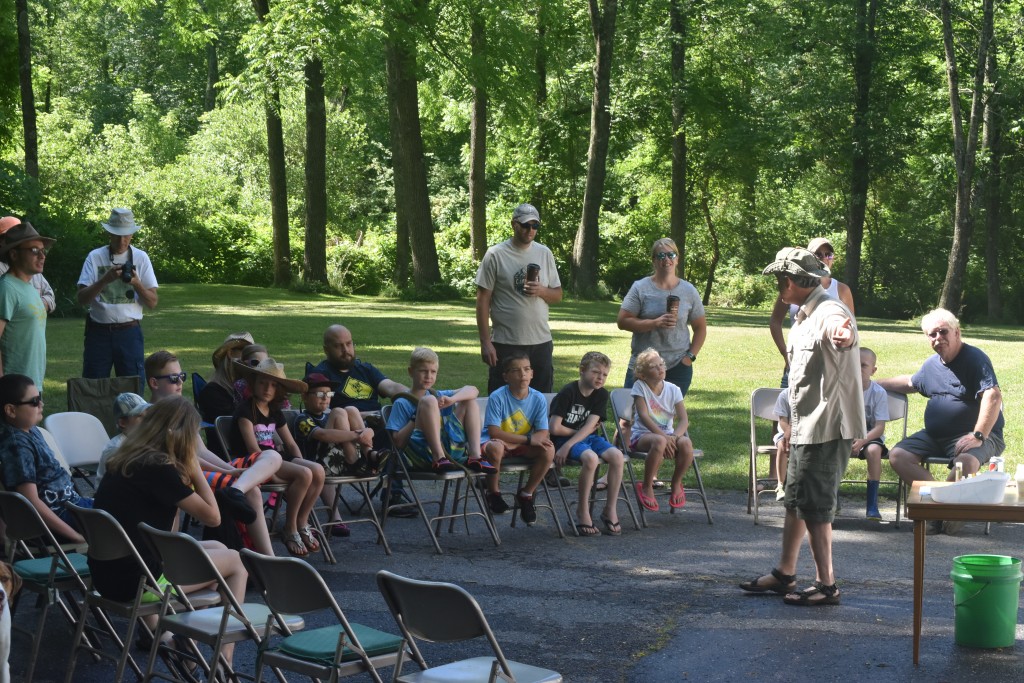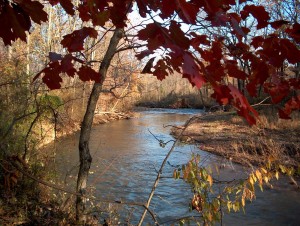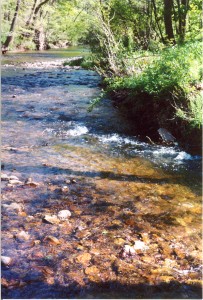Background and History
The Cooks Creek Watershed Association (CCWA) was organized in 1974. In the 50 years since its founding, Cooks Creek Watershed Association has worked to further its goal:
“To protect, preserve and improve the quality of water, land and life in the Cooks Creek Watershed.”
Education and Outreach
We believe that the education of our children in the interconnections of all life will prepare them to make life’s decisions in an environmentally friendly manner. Environmental camps have been conducted jointly by Cooks Creek Watershed Association and other nearby environmental education groups almost every year from 1975 to 1995. We have explored topics ranging from life in ponds and wetlands, forest ecology, Native Americans, and included night-time owlings. In 2000, the Cooks Creek Watershed Association revitalized its outreach for children by initiating the annual Mini-Monster Mayhem program. This half-day workshop introduces elementary age children to stream ecology and the importance of protecting water quality and conserving water resources.
Water Quality and Stream Improvement
In 1975, Cooks Creek was classified as a “warm water fishery” suitable for trout stocking. The CCWA recognized that the water quality was much higher than warm water fishery since Cooks Creek supported reproducing populations of brown and brook trout, had abundant macro invertebrates and had many other small fishes. In 1976, CCWA initiated the first stream reclassification effort and saw the creek’s classification raised to “cold water fishery.” In the late 1980s, after much work on the part of the members of CCWA, the classification was again raised, this time to “exceptional value waters”, the highest designation given by PADEP.
Stream improvement was a very important part of CCWA during the 1980s. Starting in 1977 when its first gabion was placed to divert the storm flow away from an eroding bank until 1991 when the program was completed, CCWA members worked with the Soil Conservation District, the Pennsylvania Fish and Boat Commission and Trout Unlimited to reduce soil erosion and flooding. Recent streambank stabilization efforts on the part of Trout Unlimited in Durham, Springfield and Lower Saucon have won the support of the CCWA.
Monitoring
Water quality monitoring has been a driving force of CCWA since the first reclassification of the waters of Cooks Creek in 1976. CCWA has tested the stream at varying places and times. In 1975, testing for E. coli bacteria was started and continued until 1977. The Fish Commission has surveyed the stream with shock treatments and the Delaware River Keepers Network has tested the waters for dissolved oxygen, pH, temperature, nitrates and phosphates. CCWA has joined the River Keeper and is now testing for these five parameters at four sites in the watershed. CCWA was asked to assist the U.S. Geologic Survey in measuring the groundwater levels and flows in the Cooks Creek Watershed. CCWA members participated for two years, measuring rainfall and recording meteorological events. The monitoring of the creek has been recently increased to include the activation of two stream gauging stations, one in Durham and one in Springfield as well as a monthly groundwater level monitoring program. Information from these programs will be used to develop a calibrated hydrologic model for the watershed to guard against overuse of water resources at the expense of the Cooks Creek.
Conservation and Open Space Protection
In the 1990s the CCWA helped broker an agreement that involved the donation of a 64-acre tract of land to Heritage Conservancy. This innovative approach to resource protection was the first in a long line of conservation easements in the watershed. CCWA members have consistently supported the use of PA Act 319 agricultural easements that help conserve valuable agricultural lands. In 2000, the CCWA was instrumental in convincing Springfield Township residents to support an open space referendum that included a quarter percent ( ¼%) wage tax increase to buy easements protecting our valuable open spaces. Ongoing work in conjunction with other local conservation groups focus land preservation efforts in important headwater areas and other natural areas.
Current Activities
The CCWA is currently involved in regional planning efforts that will ensure the long-term protection of the creek. Members are currently active in local government in Durham, Springfield and Lower Saucon townships to ensure that local government is following the Cooks Creek Watershed Protection Plan. CCWA recently petitioned Springfield Township to become an Audubon Society “Birdtown” which ensures residents have access to useful information, seminars and backyard habitat workshops. Our ongoing monitoring efforts will include an upgrade of our water quantity monitoring stations, showing us the benefits of strong riparian buffer protections and improvements in stormwater management. Native and invasive plant workshops are being offered to assist private landowners in this important aspect of backyard management. CCWA continues to advocate for the permanent protection of open space. The CCWA recently partnered with the StopPennEast effort to keep the PennEast pipeline out of the Cooks Creek Watershed.
Future Direction
CCWA will continue to provide leadership in local environmental issues and introduce new and exciting educational opportunities. We are always looking for volunteers to help with projects and to serve on committees and boards. If you are interested in helping, or have an idea for how we can expand our services to the community, please let us know.



